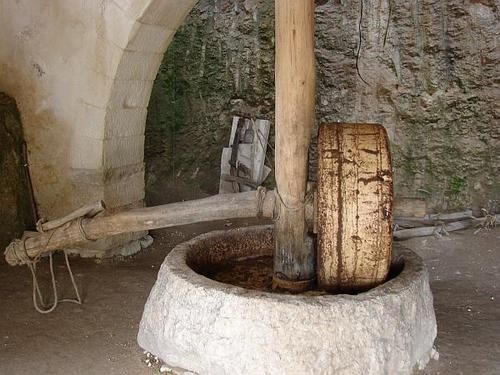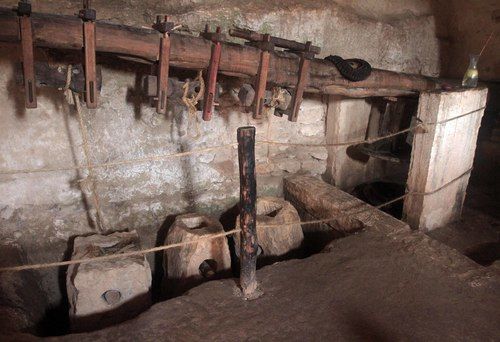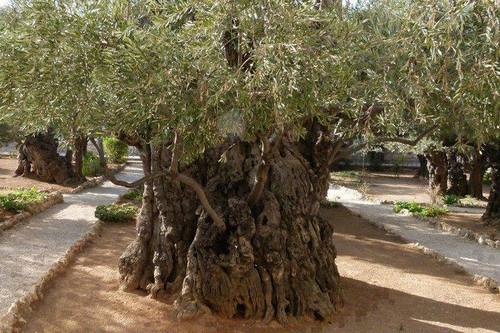The Three Presses
By Matt Vorhees
When you visit the Holy Land, a common stop during your tour will be Nazareth Village, an outdoor museum depicting what daily life in Galilee was like during Jesus' time. The ancient land was preserved on the grounds of the Nazareth Hospital. Archaeological excavations unearthed unique treasures below the surface including watchtowers, an ancient winepress, and a spring-fed irrigation system. In 2000 Nazareth village opened its doors and allowed visitors the opportunity to step back in time. Expertly led by a staff guide, you will encounter a shepherd tending his sheep, an ancient vineyard still in use, and a replica of a synagogue, among other things. But by far my favorite spot in this preserved piece of land is where the harvested olives get pressed into olive oil.

Upon entering the room, you'll see the large mill which crushes the olives during the first phase of making olive oil. If it's harvest season, you may even see a donkey at work pulling the heavy millstone pictured above.

Next, the crushed olives are gathered and transferred to the oil press in order to extract their juice. The first press produces the most pure oil. In Biblical times, this was used to fuel the lamps in the temple, for anointing oil, and for meal offerings. The oil produced during a second pressing was used for medicinal purposes. The third and final press produced oil used for soap. The olives are sent through three presses to ensure that every last bit of the olives are put to use. Nothing is wasted or left behind. Even the pulp that remained would have been used for common oil lamps or making soap.
Now, seeing this equipment and learning about the ancient practice of producing olive oil is interesting indeed. But on my first trip to Israel, one of the most meaningful and impactful insights I gained was how this process connects to the Garden of Gethsemane.
Now, seeing this equipment and learning about the ancient practice of producing olive oil is interesting indeed. But on my first trip to Israel, one of the most meaningful and impactful insights I gained was how this process connects to the Garden of Gethsemane.

You see, Gethsemane means "olive press," which is appropriate considering that it was a grove of olive trees. When you travel from the Mount of Olives in Jerusalem down to the Garden of Gethsemane today, you will still find a grove of ancient olive trees. Some of these trees dates back over 900 years and potentially descended directly from those "silent witnesses" of Jesus' agony in the garden.
In Matthew 26:36-46 we read:
Then Jesus went with them to a place called Gethsemane, and he said to his disciples, “Sit here, while I go over there and pray.” 37 And taking with him Peter and the two sons of Zebedee, he began to be sorrowful and troubled. 38 Then he said to them, “My soul is very sorrowful, even to death; remain here, and watch with me.” 39 And going a little farther he fell on his face and prayed, saying, “My Father, if it be possible, let this cup pass from me; nevertheless, not as I will, but as you will.” 40 And he came to the disciples and found them sleeping. And he said to Peter, “So, could you not watch with me one hour? 41 Watch and pray that you may not enter into temptation. The spirit indeed is willing, but the flesh is weak.” 42 Again, for the second time, he went away and prayed, “My Father, if this cannot pass unless I drink it, your will be done.” 43 And again he came and found them sleeping, for their eyes were heavy. 44 So, leaving them again, he went away and prayed for the third time, saying the same words again. 45 Then he came to the disciples and said to them, “Sleep and take your rest later on. See, the hour is at hand, and the Son of Man is betrayed into the hands of sinners. 46 Rise, let us be going; see, my betrayer is at hand.”
How many times did Jesus leave Peter, James, and John to pray alone? Three. How many times would they press the olives in the olive press? Three.
In the Garden of Gethsemane, Jesus was being pressed under the weight of what He was uniquely able to do. The cup refers to the cup of God's wrath toward the sins of the entire world; a cup that Jesus would drink down to the dregs at the cross; a cup that He began to get a taste of in the garden. And in His humanity, He staggered.
Peering over the edge of becoming sin for us ( 2 Corinthians 5:21) was more horrific than He imagined, and He asked the Father for another way, if possible.
But there was no other way.
Even still, Jesus wanted the Father's will more than he wanted to be spared from the terror that awaited Him.
Jesus' example encourages us at this point. First, we ought to worship when we remember the Garden because our Savior displayed heroic courage when peering into the chasm of sin and death. Never did He waiver in His obedience. Second, we ought to follow the example of Jesus. When faced with something that we know we need to do but struggle, we must entrust ourselves to our heavenly Father by praying the same thing as Jesus, “Nevertheless, not my will, but yours be done.”
In Matthew 26:36-46 we read:
Then Jesus went with them to a place called Gethsemane, and he said to his disciples, “Sit here, while I go over there and pray.” 37 And taking with him Peter and the two sons of Zebedee, he began to be sorrowful and troubled. 38 Then he said to them, “My soul is very sorrowful, even to death; remain here, and watch with me.” 39 And going a little farther he fell on his face and prayed, saying, “My Father, if it be possible, let this cup pass from me; nevertheless, not as I will, but as you will.” 40 And he came to the disciples and found them sleeping. And he said to Peter, “So, could you not watch with me one hour? 41 Watch and pray that you may not enter into temptation. The spirit indeed is willing, but the flesh is weak.” 42 Again, for the second time, he went away and prayed, “My Father, if this cannot pass unless I drink it, your will be done.” 43 And again he came and found them sleeping, for their eyes were heavy. 44 So, leaving them again, he went away and prayed for the third time, saying the same words again. 45 Then he came to the disciples and said to them, “Sleep and take your rest later on. See, the hour is at hand, and the Son of Man is betrayed into the hands of sinners. 46 Rise, let us be going; see, my betrayer is at hand.”
How many times did Jesus leave Peter, James, and John to pray alone? Three. How many times would they press the olives in the olive press? Three.
In the Garden of Gethsemane, Jesus was being pressed under the weight of what He was uniquely able to do. The cup refers to the cup of God's wrath toward the sins of the entire world; a cup that Jesus would drink down to the dregs at the cross; a cup that He began to get a taste of in the garden. And in His humanity, He staggered.
Peering over the edge of becoming sin for us ( 2 Corinthians 5:21) was more horrific than He imagined, and He asked the Father for another way, if possible.
But there was no other way.
Even still, Jesus wanted the Father's will more than he wanted to be spared from the terror that awaited Him.
Jesus' example encourages us at this point. First, we ought to worship when we remember the Garden because our Savior displayed heroic courage when peering into the chasm of sin and death. Never did He waiver in His obedience. Second, we ought to follow the example of Jesus. When faced with something that we know we need to do but struggle, we must entrust ourselves to our heavenly Father by praying the same thing as Jesus, “Nevertheless, not my will, but yours be done.”
Posted in Matt Vorhees
Recent
Archive
2025
June
July
December
2024
July
September
October
2023
April
May
December
2022
April
August
December
2021
January
March
September
November
Categories
no categories
